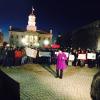Dear Colleagues:
It is difficult for me to express the depth of my feelings about the heroic actions of our country during World War II. Our veterans and our allies prevented the extermination of my people.
I often wonder what my life would have been like had I lived in another country or another time; being Jewish, I could have lived a life of horror and helplessness. I am safe and free because of the spirit that moved this country to act. That spirit is best expressed in the founding documents of our nation, an immovable commitment to liberty and human dignity, a willingness to shed our blood when those rights are threatened.
It is with this in mind that I write to address recent concerns regarding the new framework for the College Board’s AP® U.S. History course.
I want to begin by thanking our critics for their vigilance; they are patriots who care deeply about what students learn.
I joined the College Board as president in October 2012, after the new U.S. History framework was developed and released. But that fact does not mean I take any more lightly my responsibility to ensure that this course, and everything we do, prepares students to thrive in our democracy.
Although I did not work on the new AP U.S. History framework, I did help shape the College Board’s recent announcement that, on every SAT®, we will now require that students analyze a founding document or a work from the enduring great conversations on liberty and dignity that those documents inspired. The College Board made this historic decision for a simple reason — to have command of these documents opens worlds of opportunity in college, career, and civic life.
So it is with deep concern that I’ve reviewed the claim that the new AP U.S. History course “will erase the great sacrifices from the minds of America's children.” That concern has moved the College Board to take an unprecedented action today: We are releasing a full sample exam for the new AP U.S. History course to the American public.
You can view it online here.
People who are worried that AP U.S. History students will not need to study our nation’s founders need only take one look at this exam to see that our founders are resonant throughout. The exam opens with an excerpt from The Autobiography of Benjamin Franklin. On this college-level exam, students will need to not only analyze George Washington’s “Farewell Address” with care, but also articulate the influence of Washington’s words on American foreign policy in the 20th century. Students encounter one of Franklin Delano Roosevelt’s earliest calls to our country to gather itself to combat tyranny abroad. Every question on the new AP U.S. History Exam now requires students to demonstrate an understanding of America’s important historical documents and leaders. Students who pass this exam will not only be more ready for college, they will be more ready to be citizens.
We hope that the release of this exam will address the principled confusion that the new framework produced. The concerns are based on a significant misunderstanding. Just like the previous framework, the new framework does not remove individuals or events that have been taught by AP teachers in prior years. Instead, it is just a framework, requiring teachers to populate it with content required by their local standards and priorities.
We will soon release a clarified version of the course framework to avoid any further confusion. And, for the first time, we commit to releasing the AP U.S. History Exam every year to the teaching community for consideration and deliberation. AP courses and exams are designed not by the College Board but by college professors and K–12 teachers throughout this country; we are grateful for their work and will do more than ever to share the content with teachers, students, and parents.
Respectfully,
David Coleman
President and CEO
The College Board
















